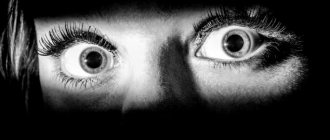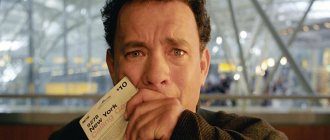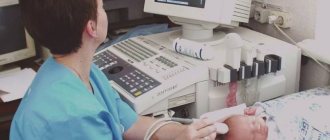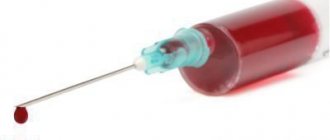What is the fear of needles called?
The fear of needles and syringes, according to biologists, did not appear out of the blue in many people, and the fear itself is associated precisely with genetic memory. The fear of needles is based on ancient fears of the bites of poisonous snakes, reptiles and insects. Many people suffering from a phobia do not know what the fear of needles is called and, accordingly, do not understand how it can be treated.
The fear of syringes and the insertion of the needle itself has a name - trypanophobia. According to many experts, many people received this fear precisely from childhood, when poor-quality medical care, lack of proper treatment of patients, and doctors’ negligence in their work flourished.
The fear is not as safe as it seems, as the phobia causes people to avoid any treatment that involves injections. Even in a life-threatening situation, a trypanophobe will refuse until the last minute from injections and drawing blood from veins or fingers.
Attention! Trypanophobia should not be confused with iatrophobia, which manifests itself in the form of fear of hospitals, doctors, tests and treatment.
In the post-Soviet space and in Russia, thick metal needles and reusable syringes have been used in medicine for a long time, and therefore almost a quarter of the population suffers from trypanophobia. It is noteworthy that when in countries where disposable syringes with thin needles appeared, the number of people with this fear decreased.
Types of trypanophobia
Trypanophobia is divided into the following subtypes:
- Fear associated with piercing the skin with a syringe needle. A trypanophobe may experience a panic attack from replaying the image of the procedure in his head, from viewing pictures, videos demonstrating the process of inserting a needle into the skin. Such a person can even run away from the office where they take blood for analysis or give injections.
- Fear of syringes and needles from them , including photos and videos with them.
- Fear of air bubbles that can enter the vessel and cause an air embolism. Some ignorant trypanophobes may begin to panic about air bubbles in an IV bag, although this fear is completely unfounded: air from the bag cannot physically enter the vein.
- Fear of the physical consequences of injections : bumps, bruises and even an abscess due to a medical professional’s mistake.
- Fear that the syringe needle will break during the procedure and remain in the body. Because of fear, the likelihood that this will happen even increases slightly: the patient involuntarily tenses his muscles during an intramuscular injection and moves, which becomes the reason for this, especially if the needle is of poor quality and the procedure is performed by an incompetent specialist.
- Fear of getting dangerous infectious diseases through blood contact : through an unsterile needle. In most medical institutions, syringes are not reused and the packaging with them is opened in front of the patient, so the likelihood of getting the disease is low.
And in order for air entering the vessel through a syringe to really cause harm, it must be introduced in large quantities - at least 150-200 milliliters - and the vessel itself must be large.
Trypanophobes may have all or part of these fears. They also often have other phobias associated with medical procedures, diseases and doctors.
Injections and the risk of embolism . Air in the syringe - how dangerous is it:
How to get rid of the fear of death? Read about it here.
Manifestations and signs of the disorder
Russian specialists in the field of psychiatry managed to conduct a survey among 50 people and find out exactly what associations they have when they need to get an injection.
Main manifestations and signs of phobia:
- The patient is afraid of the consequences of the injection, or rather the painful sensations . Such a person will try to avoid piercing any parts of the body: muscles, grafting into the shoulder blades or buttocks. He may also be especially frightened by the fact that the doctor has a “heavy hand”, and the needle may turn out to be dull, and this will only intensify the pain. Previously, reusable glass syringes were used, and the needles became dull due to sterilization. This made the penetration of the needle under the skin painful. Currently, not all hospitals use high-quality needles from reputable manufacturers.
- The fear that air will enter through the syringe and the person will die is also often present in trypanophobes. Unqualified health workers really do not know how to completely knock out air bubbles from a syringe. However, those who are afraid should know that exposure to oxygen is indeed dangerous. But provided that a large amount of air mass has entered the vein. A small air bubble will not cause harm to health, but will simply dissolve in the lymph. This means that injections into the gluteal muscles or arms are not dangerous.
- The child may simply be afraid of doctors , who, if they disobey, may begin to shout at him or use force. Fear can persist until adolescence. In adulthood, a person will avoid any contact with the hospital, injections at the dentist and other specialists.
- The fear of a bruise or hematoma is due to the fact that a person is afraid of infection from the needle and an abscess. If the needle is not inserted deep enough, the skin is not disinfected and a non-sterile syringe is used, a bruise or wound may appear. This can be avoided by strictly following the rules.
- Some trypanophobes fear that the needle may reach bone tissue or get stuck under the skin . This fear can be refuted by the fact that injections are given in certain parts of the body, where contact of the needle with bone tissue is maximally excluded. Only low-quality steel can break, so you should only contact professional doctors if you have such a fear.
We recommend reading: How not to be afraid of a fight and be brave
Many people do not understand how to stop being afraid of needles due to accompanying phobias. These could be fears:
- viral infections (germaphobia);
- infection or illness from a medication (mysophobia);
- syphilis (syphilophobia);
- HIV infection (speedophobia);
- side effects.
How to stop being afraid of injections?
Reassurance that your fears are unfounded usually helps. Before the injection, notify your healthcare provider about your concerns - a professional will allay them easily; you can buy a high-quality syringe if you don’t trust budget ones.
Take advantage of the advice of psychologists on how not to be afraid of injections and avoid panic during the procedure:
- Do not watch the medical worker’s manipulations - try to distract yourself. You can use your smartphone for this;
How to stop being afraid of injections in the buttock? Don't be too serious, laugh at an awkward situation. A sense of humor will help cope with this need. Laughter can produce endorphins - happy hormones that have an analgesic effect and reduce anxiety.
- Scientists have proven that 15 minutes of laughter reduces the level of fear in trypanophobia by 60%.
If children are afraid of injections
Often it is children who are afraid of injections. This is explained by the nervous atmosphere in the hospital, mistrust of a stranger in a white coat, and unpleasant sensations during the procedure.
Help your child cope with stress with these techniques:
- Hospital game. Pre-play the plot at home on toys, explain why this is necessary without intimidation;
- Going to the doctor as part of the game. Come up with a story or fairy tale that the child will be a part of;
- Surprise. Prepare a gift for your child. Such completion of an unpleasant procedure can please, and waiting for a gift can distract.
Is the girl afraid of injections in the butt? Distract her with a new toy or unexpected news; this will be easier to do since she does not see the doctor’s manipulations.
As a parent, behave calmly - do not transfer your nervousness to your child, but contain his emotions.
How to give injections if you are afraid?
How not to be afraid to give injections to yourself or another person? The main thing here is to prepare properly:
- Be confident in the theory of injection - watch videos, read instructions. This preparation will add confidence;
- Clearly understand the need for the procedure, tune in to a positive outcome;
- Practice. Avoiding such a procedure increases fear even more.
Many people experience what trypanophobia is. In most cases, you can cope with a phobia on your own. But if panic makes you avoid the necessary procedure, seek help from a psychologist, he will help you overcome trypanophobia.
Forms of the disorder, symptoms
Doctors suggest that trypanophobia is inherited. The fear reaction is caused by the very sight of the needle and the idea that it will get under the skin. According to the theory, in prehistoric times, our ancestors could faint at the sight of arrows with sharp tips. They also developed fear at the sight of someone else’s or their own blood.
Reference! Fainting and falling from loss of consciousness during inter-tribal clashes helped to survive - the enemy thought that the person was simply dead.
The main symptoms of trypanophobia:
- hum, noise and ringing in the ears;
- increased pulse and rapid heartbeat;
- pallor;
- weakness and dizziness;
- sweating;
- nausea;
- surges in blood pressure.
If a person begins to feel faint or several of the above symptoms before the injection, he begins to develop a secondary phobia. A person thinks about the question of how not to be afraid of injections, so as not to embarrass himself in front of other people if he falls or hits himself.
If a person had negative experiences associated with injections in childhood, then he will develop an associative form of fear. This can happen when a child saw his sick relative get an injection, and after some time he did not survive.
Associative phobia of injections manifests itself in the form of:
- panic attacks, tears;
- prolonged anxiety of varying degrees;
- insomnia;
- headaches and dizziness.
About 20% of trypanophobes suffer from a resistive form of fear, which is manifested by the following symptoms:
- tachycardia;
- increased blood pressure;
- trembling in muscles and body;
- aggression and tears.
Any of these forms of phobia are caused by a psychological trigger - an event or thing associated with a re-experience of the trauma. Attacks of panic and fear may appear not before the injection procedure itself, but already at the sight of a hospital, a doctor, or even a picture of a fear injection.
We recommend that you read: Fear of spiders - what is the name of the phobia and how to stop being afraid of them
Fear of injections in children ↑
The topic of children's fears of injections will always be relevant. A child who can easily tolerate medical procedures of this kind is rare. Therefore, at all times, parents will resort to all sorts of tricks to ensure that their children receive the necessary injections.
Recommendations for the most “soft” procedure for a child:
- Discuss with your child a trip to the treatment room in advance;
- there is no need to resort to deception and say that injections do not hurt;
- it is important to explain the reason why you have to give injections;
- you cannot intimidate a child with injections and “evil nurses” who give injections to naughty children;
- play “hospital play” with your child more often, playing the roles of a patient and a medical worker.
In the fight against fears, parents tend to go too far, so that the effect does not turn out to be the opposite, it is important to know some points:
- do not ignore the child’s fear;
- aggressive attacks are unacceptable;
- it is impossible to attract a feeling of shame with the words “be brave”: this leads to the formation of low self-esteem and loss of trust in the world around you;
- Various maneuvers distracting from the injection do not make sense; the child has the right to experience healthy fear;
- You can joke a little in order to reduce the intensity of fear, but in moderation, otherwise anxiety will only increase.
Read the article about the reasons for the fear of love. How to overcome the fear of public speaking? Read more.
Fear of closed spaces in adults: how to eradicate it? Find out from the article.
The experience of many parents suggests that children are able to outgrow their fears of injections. Thoughtful and well-structured behavior of parents will allow them to overcome such difficulties easily and in a short time.
Fears haunt a person throughout his life. And medical intervention, even the most harmless one, can cause real panic. However, the need for injections, both for therapeutic and preventive purposes, is increasing every year. In this regard, it is so important to learn to control your fears and cope with them.
Video: Advice from Spanish researchers
Causes of fear of needles and pricks
Scientists have identified three groups of reasons leading to this fear. These include:
- social;
- psychological;
- genetic.
In underdeveloped countries, the social factor of fear is more often manifested, where the population is provided with low-quality medical services. Psychological fear of injections and vaccinations is associated with a defense mechanism. Thus, the phobia protects the human body from low-quality therapeutic intervention. In the best development of the situation, a person is looking for more professional, expensive doctors whom he can trust.
Important! Genetic phobia is the only case where fear is not associated with childhood trauma or social factors.
Fear of needles and syringes is often compared to a psychological mechanism that was described by Sigmund Freud: a person hears negative comments about doctors or, as a child, was threatened with an injection for bad behavior. Such actions lead to reluctance to turn to medicine when necessary and avoidance of people in white coats.
How to overcome trypanophobia
Trypanophobia can be cured without the use of antidepressants, tranquilizers and homeopathic medicines.
Psychotherapy
In rare cases, the help of a psychotherapist is required. The specialist will be able to identify the cause of trypanophobia and will try to help overcome it using certain techniques of communication with the patient.
Self help
It is important not to watch the nurse perform the procedure. You can distract yourself with music, for example, use headphones during and before the process. It is also recommended to inform the doctor in advance about your phobia, so that he understands that such a patient must be treated with the utmost caution.
Medication
Therapy is used in rare cases, for example, when a person begins to have a panic attack and fear in the hospital. To get an injection, a person is given tranquilizers and sedatives in tablets.
Treatment methods for a child
It is difficult to explain to a child how not to be afraid of vaccinations, for example, in the shoulder or arms, as well as injections in different parts of the body. Doctors most often use the method of distraction with a beautiful picture or toy.
We recommend reading: How to overcome the fear of losing a loved one
It is also important that the nurse speaks warmly and friendly to the child, then he will not feel dangerous or threatened.
This is interesting:
Fear of holes and a large number of holes.
Practical methods for dealing with stress.
How to force yourself to do something if you don’t want to?











